Papers by Loren B. Landau
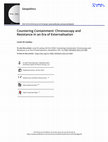
Geopolitics, 2024
This article offers a blunt response to diverse explorations of varied forms of externalised bord... more This article offers a blunt response to diverse explorations of varied forms of externalised bordering modalities. It argues that when taken together, such approaches reflect a form of chronoscopic policing that uses data and narrative framing to pre-criminalise potential migrants. Collaboration among agencies, states and researchers visibilise and moralise, framing poor people’s inclinations to move as misguided, dangerous betrayals of law, community, country and self. Wealthy states then use the accounts and materials they produce as foundations for externalised controls that seek to prevent future deviations through current interventions. This short piece reflects on possibilities for addressing this emergent regime in ways that can produce systemic, humane change. More specifically, it considers three potential affronts – alternative narratives and practices – on contemporary border mechanisms at work between and within states: bodily assault on borders or ‘storming the gates’; ‘migration as decolonisation’; and broader practical and narrative efforts to destabilise histories and territories. I propose that this latter approach – informed by notions of ’nomadic power’ and decolonial imaginaries – offers the most potent opportunities for countering the moralising affect underlying the current chronoscopic project.

Environment and Urbanisation, 2024
We critically examine a multi-year initiative led by Cities Alliance with municipalities and civi... more We critically examine a multi-year initiative led by Cities Alliance with municipalities and civil society groups in Somaliland, Kenya, Uganda, and Ethiopia to respond to refugees and migration. Adapting Goffman's work, we posit that in ambiguous and resource-scarce political environments, network success rests on supporting two "frontstages" and a shared "backstage". On stage one, authorities "visibilize" refugees to attract funding and national support while shaping national-level norms. On stage two they make refugees "invisible" within their own development strategies, integrating displaced populations into urban planning through data collection, service investments, and inclusive strategies. In an experimental and collaborative backstage, municipal actors share resources and workshop varied scripts for their respective audiences. The initiative has lessened host-refugee tensions, strengthened municipal voices in national and regional policy fora, fostered local accountability, and created financial and bureaucratic resources better able to outlast the vagaries of humanitarian or emergency aid.

Migration and Cities: Conceptual and Policy Advances, 2024
Cities are sites of institutional innovation, norm setting, and material production. They are whe... more Cities are sites of institutional innovation, norm setting, and material production. They are where the majority of the world's population live (United Nations, 2018). Across Sub-Saharan Africa, rapid population growth and geographic expansion only emphasises cities' importance. Countries whose populations were primarily rural a generation ago now see the burgeoning of capital and secondary cities (Lucas, 2021). While cultural heterogeneity has always been a norm in African cities (O'Connor, 1983), the pace and nature of growth has added levels of difference. Language, class, race, and religion are part of this story. So too are people's position in spatio-temporal circuits linking them to families, friends, and at multiple sites and in multiple potential futures. Some remain locally oriented, dedicated to building lives in situ; others live on the margins, impoverishing themselves, intentionally disconnected from people and institutions to build a future life elsewhere while remaining deeply connected to multiple sites where they have family, friends, or business interests. Sometimes they imagine lives in futures they cannot yet name but have only ideas of a place where life offers a future less beset by economic and physical precarity (see Franck, 2021), where they can become more than they are. These diverse orientations and trajectories generate multiple political valences. While some seek political inclusion and recognition, others shy away from it. The diversity this engenders layers multiple, determined, and open-ended geographic and temporal orientations atop class, ethnicity, religion, and language. Differential histories of political mobilisation add further dimensions, with some residents seeking remedies through public institutions and others indifferent to or fearful of them. The proliferation of mayoral forums to address issues of migration reflect the importance of understanding urban policymaking and the politics associated with
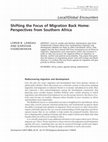
Development, 2007
Loren B. Landau and Darshan Vigneswaran raise three fundamental critiques about how contemporary ... more Loren B. Landau and Darshan Vigneswaran raise three fundamental critiques about how contemporary migration and development debates are likely to affect sub-Saharan Africa. They suggest that the focus should shift from movements out of Africa to migration, displacement and urbanization within the continent in order to take into account the negative effects of migration on families, conflict and political accountability. They argue that given that the balance of negotiating power rests with Europe and North America, it is unlikely that any future agenda on migration will give priority to African interests. KEYWORDS Africa; policy; agenda setting; displacement Rediscovering migration and development Over the past two years, migration and development have been primary themes in global policy debates. These discussions are a welcome counter to discourses painting migration (and migrants) as inherent threats to economic and physical security. They also represent a slow acknowledgement among the 'development community' that planning must consider human mobility. Without more careful attention to which migrations and what kind of development we are discussing, however, this flurry of activity may become yet another chimaera whose benefits to poor countries in Africa and elsewhere never materialize. The likelihood of poor or unintended outcomes is heightened in sub-Saharan Africa where data scarcity prevents informed predictions and institutional incapacity limits the ability to manage and capitalize on migration. There are moves to collect more information and build capacity, but our current understanding of both migration and development means that we are unlikely to help realize the promised benefits. Moreover, forces shaping policy-making in Europe and Africa make it all the more likely that what benefits there are will accrue outside of Africa. It is critically important to pay additional attention to the region where most African migrants are: Africa. The key question is whose interests the migration and development agenda will serve, something that can only be answered through careful and empirically informed discussions.We hope the paper contributes to such a discussion.
imi.ox.ac.uk, 2009
This series provides a forum for researchers to publish preliminary findings on themes related to... more This series provides a forum for researchers to publish preliminary findings on themes related to forced migration in Africa. These papers may be cited (including the full URL and the date downloaded), but reproduced only with direct permission of the author.

International Migration, 2021
Stephen Castles' passing presents a bittersweet opportunity for reflection. A diminutive man but ... more Stephen Castles' passing presents a bittersweet opportunity for reflection. A diminutive man but towering scholarly figure, his personal generosity and extraordinary scope of research will have a lasting impact on many of us. That impact extends beyond the content of his publications, teaching and collegiality to 'migration studies', a field he pioneered more than perhaps any other single scholar. Through his own work, as a supervisor, and as an institution builder, he has shaped a generation. Perhaps two. With more to come. As someone who has long collaborated with (and who now works within) the somewhat bewildering migration studies universe he helped forge at the University of Oxford, I daily feel and hear echoes of his work. Castles' substantial efforts to locate studies of displacement and migration on sound conceptual and methodological foundations have provided a blueprint for similar initiatives around the world. His influence on the Centre for Migration Policy and Society (COMPAS) and the International Migration Institute-both at Oxford-manifested his commitment to social scientific research on migration and mobility that corrodes popular myths and political misconceptions. Even while his work was expansive in its ambition and scope, it rarely failed to centre the implications for those who moved, those unable to do so, or the communities transformed by human mobility. His dedication to building spaces for and inspiring methodologically sound, morally grounded, university-based research is more important than ever. Immigration and displacement are now at the centre of political debates across the world. In response, migration research institutes and researchers have blossomed like desert flowers after heavy rains. Many are nourished with funding dedicated to 'managing' migration in ways 'safe and orderly.' While migrant safety and welfare is often a stated goal, these bodies form part of a political economy of knowledge potentially undermining the kind of critical scholarly enterprise Castles envisioned. Instead, 'migration studies' may follow the course of Victorian anthropology, legitimized (or at least funded) by state and non-state actors with neo-imperial ambitions. The field already rewards those proving useful to powerful states and state supported agencies. Academic metrics privileging 'impact' only exacerbates these trends. In this space, Castles' perennial efforts to highlight the human consequences of migration, drawing attention to multiple forms of labour exploitation, resource extraction, ethnic reformulation, and racial discrimination were important counter measures to these tendencies. Many of us remain inspired by his efforts to denaturalize the technocratic language of economics and bureaucrats who seek to This is an open access article under the terms of the Creative Commons Attribution-NonCommercial-NoDerivs License, which permits use and distribution in any medium, provided the original work is properly cited, the use is non-commercial and no modifications or adaptations are made.
Journal of Regional Science, 2012
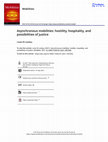
Mobilities, 2021
Metrics of success, status, and justice are founded on subjective narratives of spatialized pasts... more Metrics of success, status, and justice are founded on subjective narratives of spatialized pasts and futures. This article considers three moralised spacetimes-chronotopes-and their relations to people's mobility within and from sub-Saharan Africa. The first stems from European efforts to promote 'development at home' which places Africans on a separate temporal trajectory. By discursively positioning Africans outside global space and futures, Europe subsequently denies claims to European space or lives beyond African territory. Moreover, coding border crossing as deviant justifies an apparatus to return Africans to their space-time where they can achieve justice. The latter two chronotopes emerge dialogically among citizens and immigrants in South Africa's 'global city.' Amidst Johannesburg's polyrhythmicity, citizens position themselves in a chronotope of stalled transformation where justice comes by remedying deprivations inherited from an apartheid past. This rubs against international migrants operating in a mode of deferred distanciation: using the city to achieve rights and recognition in future elsewhere. These competing temporalities deny possibilities of a mutually shared definition of justice or spatial claim making. This article ultimately positions chronotopes as critical elements in migration infrastructures that shape movements, conditioning interactions, and foreclosing (or opening) possibilities for justice across or within space.

Urban Emplacement: Transversal Solidarities and Politics of Possibility, 2022
The concepts of immigrant integration, transnationalism, and the nature of
urban publics remain a... more The concepts of immigrant integration, transnationalism, and the nature of
urban publics remain at the center of popular and political debate across
much of the western world. Although such concerns have been less evident in discussions of African cities and mobilities, increased interest in mobility within the global south is drawing additional attention to the urban spaces serving as destination and stations for migrants on the African continent. This raises fundamental questions about the actors, process, ethics and scales associated with urban becoming and community making. The social heterogeneity and translocality of such spaces are fertile grounds for social experimentation drawing on variegated histories and moral systems. Amidst these transforming and emergent urban spaces, this chapter identifies a form of ’tactical cosmopolitan’ that outsiders develop through interactions with potentially inhospitable people and places. Unable – or uninterested – in addressing sources of structural exclusion, this discursive mechanism reflects a kind of usufruct ethics: a means of establishing rights to space aimed at achieving protection and benefit without communal membership or community cohesion. Rather than a coherent philosophy, this is a form of ‘cosmopolitanism from below,’ an amalgam of rhetorical and organizational tools chosen magpie- like from more established discourses and value systems. It is a kind of ‘thin’ cosmopolitanism
that instrumentalizes rather than commits to its power and universalist duties.

Migration Studies, 2022
This special issue calls on scholars to simultaneously centre and unsettle the margin: to recogni... more This special issue calls on scholars to simultaneously centre and unsettle the margin: to recognise the multiplicity of margins as politically generative spaces, frequently contoured by sustained and varied forms of mobility. Taken together, the studies collected in this volume are a call to view margins as vital socio-political spaces and objects of study. They are created, transformed, or maintained through interactions among the multiple ethnic, political, or religious groups within it but also through connections to allies, families, and interlocutors elsewhere that people in the margins draw in. Powerful states, corporations, and other play a role, but the contributors do not presume they are the most significant force at play. To be sure, margins can reflect liminality and suspension, but they are also sites of contentious politics. As space-time compression, multi-localism, economic precarity, and political fragmentation continue apace, margins are decreasingly discrete spaces between, but are instead spaces where lives are made. As sites that help structure engagements among groups-and sometimes within the groups themselves-appear and fade, margins take on varied levels of significance as contestations and convivialities take shape and transform. They are multiple, often intersecting, sometimes geographic and formally demarcated, sometimes largely invisible or unspoken but no less powerful. And they can be anywhere.
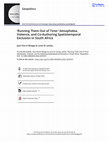
Geopolitics, 2022
Immigration governance scholars often focus on formal, national regulations and how local impleme... more Immigration governance scholars often focus on formal, national regulations and how local implementation and resistance rations access to space and resources. Research into 'xenophobic' exclusion across South Africa suggests recalibrating research along two spatial and temporal dimensions. First, while legal and political discourse often evoke national principles, exclusive speech and action can be highly spatialised and distinctly sub-national. Consequently, people objectively belonging to the same, excludable category (e.g., international migrants; sexual or ethnic minorities) face varied vulnerabilities corresponding to where they work or reside. Moreover, when mobilising nationalistic discourses of exclusion and belonging, subnational actors customise and emplace them. Such coauthoring infuses them with particularistic interests and language while imposing spatial limits on their legitimacy. This in turn generates a dynamic patchwork of regulatory regimes where local variations may be more practically important than national policy. Second, the effects of coauthored exclusion are spatial, but their foundations may be temporal. South Africa's national political project rests on forms of restorative justice: of building futures for those materially disadvantaged and disenfranchised by Apartheid's racist machinations. For South Africans, making claims to a future in place (i.e., in the country or a given site) are predicated on one's position in this national temporal arc. Even if apartheid disadvantaged millions across Southern African, non-citizens are historiographically excluded from these claims. Immigrants are, in effect, run out of time. By eliding shared pasts, officials and citizens deny the possibility of a spatial future shared with nonnationals. These elements help explain the popular legitimacy of anti-immigrant mobilisation and surface the multiple modes of citizenship and exclusion operating across the country. Recognising this, the article ultimately encourages scholars to re-spatialise and temporalise the study of migration governance in ways that also recognise the dialogical dimensions of bordering and emplacement.

Journal of Refugee Studies, 2012
Networks and north–south partnerships have become prerequisites for much forced migration researc... more Networks and north–south partnerships have become prerequisites for much forced migration research funding. The objectives vary but usually include levelling the scholarly playing field, improving research quality, building southern capacity and relaying southern perspectives to northern policymakers. Reflecting on a decade’s work in Southern Africa, this article suggests such initiatives often fall short of their objectives due to both mundane reasons and fundamentally unequal resource endowments and incentive structures. Moreover, by pushing southern researchers towards policy-oriented research, filtering the voices heard on the global stage, and retaining ultimate authority over funding and research priorities, these networks risk entrenching the north– south dichotomies and imbalances they purport to address. While inequalities are rooted in an intransigent global political economy of knowledge production, the article nonetheless concludes with a series of practical steps for improving southern-generated research and future collaborations.
Journal of Refugee Studies, 2011

Journal of Refugee Studies, 2012
"This account reflects on potential challenges and benefits of designing and conducting a re... more "This account reflects on potential challenges and benefits of designing and conducting a research project with ‘local’ practitioners. The collaboration with local practitioners provided a surprising mix of challenges and opportunities. It reveals that operational agencies often collaborate or conduct research or assessments for their own purposes and are often biased due to limited research capacity, untested presuppositions, or a strong (and understandable) desire to ensure that their results affirm a need which the relevant agency can help to address. That said, operational agencies often bring with them extensive knowledge about the geographical and human environments that can assist in designing a survey and negotiating access to difficult and potentially hostile communities. While somewhat compromised, the data produced by this sampling strategy and collaboration is powerful and useful in revealing—and challenging widely-held assumptions about—differences in socio-economic and safety vulnerabilities among groups and sub-places sampled."

Journal of Refugee Studies, 2014
Global, regional and national refugee law and policy present important sites for contestation, ag... more Global, regional and national refugee law and policy present important sites for contestation, agenda setting, normative pronouncements and symbolic action. But international and even domestic legislation seldom realize the promises of protection. In the kind of weakly legalized environments in which many self- settled refugees reside, progressive protection regimes may be far removed from the realities of refugees’ lives. Drawing primarily on research from South Africa, this paper makes a two-part argument. The first highlights the narrow practical and analytical value of focusing on legal reforms and formal ‘refugee’ policy as determinants of protection, given that legal status and documentation have only limited practical protection effects. The second argument is that even in analysing refugee policy, we must grant considerable space for bureaucratic autonomy. The paper concludes with a dual call: first, to broaden our focus of refugee law and policy to include a range of other social and political policy fields so that formal commitments to refugee protection can be translated into practical protection; second, it asks analysts to take sub-national bureaucracies far more seriously as sites of policy formation and practice. Such a perspective requires introducing a spatialized, socialized and politicized understanding of institutional incentives and operations. Together these will offer a more realistic understanding of protection possibilities through policy and illuminate the practices associated with state actions relating to the displaced.
INTERNATIONAL MIGRATIONS AND LOCAL GOVERNANCE, 2018



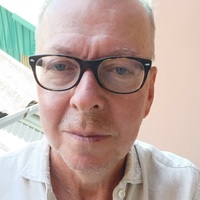







Uploads
Papers by Loren B. Landau
urban publics remain at the center of popular and political debate across
much of the western world. Although such concerns have been less evident in discussions of African cities and mobilities, increased interest in mobility within the global south is drawing additional attention to the urban spaces serving as destination and stations for migrants on the African continent. This raises fundamental questions about the actors, process, ethics and scales associated with urban becoming and community making. The social heterogeneity and translocality of such spaces are fertile grounds for social experimentation drawing on variegated histories and moral systems. Amidst these transforming and emergent urban spaces, this chapter identifies a form of ’tactical cosmopolitan’ that outsiders develop through interactions with potentially inhospitable people and places. Unable – or uninterested – in addressing sources of structural exclusion, this discursive mechanism reflects a kind of usufruct ethics: a means of establishing rights to space aimed at achieving protection and benefit without communal membership or community cohesion. Rather than a coherent philosophy, this is a form of ‘cosmopolitanism from below,’ an amalgam of rhetorical and organizational tools chosen magpie- like from more established discourses and value systems. It is a kind of ‘thin’ cosmopolitanism
that instrumentalizes rather than commits to its power and universalist duties.
urban publics remain at the center of popular and political debate across
much of the western world. Although such concerns have been less evident in discussions of African cities and mobilities, increased interest in mobility within the global south is drawing additional attention to the urban spaces serving as destination and stations for migrants on the African continent. This raises fundamental questions about the actors, process, ethics and scales associated with urban becoming and community making. The social heterogeneity and translocality of such spaces are fertile grounds for social experimentation drawing on variegated histories and moral systems. Amidst these transforming and emergent urban spaces, this chapter identifies a form of ’tactical cosmopolitan’ that outsiders develop through interactions with potentially inhospitable people and places. Unable – or uninterested – in addressing sources of structural exclusion, this discursive mechanism reflects a kind of usufruct ethics: a means of establishing rights to space aimed at achieving protection and benefit without communal membership or community cohesion. Rather than a coherent philosophy, this is a form of ‘cosmopolitanism from below,’ an amalgam of rhetorical and organizational tools chosen magpie- like from more established discourses and value systems. It is a kind of ‘thin’ cosmopolitanism
that instrumentalizes rather than commits to its power and universalist duties.
In more than fourteen months of qualitative and quantitative research, Loren Landau found that the refugee influx did not produce the deleterious economic and environmental effects often assumed. Outside the camps, a Tanzanian population long at the margins of their own country’s economics and politics became incorporated into systems of power and authority which linked them to Dar es Salaam, central Africa, Geneva, Washington, and the grain farmers of the American Midwest. Amidst the violence and conflict surrounding the camps, they became ‘Tanzanian’ as never before by exalting the territory, the nation, and a political leadership that delegated responsibility for security and services to others: the United Nations, nongovernmental organisations, and the citizenry. The result was a hybridised regime of power shaped by history, contingency, self-interest and perception: a political form that questions models of rural transformation and the functional basis of the modern nation-state.
The Humanitarian Hangover is a valuable resource, not only for scholars of displacement but also for political scientists and sociologists concerned with how displacement and humanitarianism can serve as primary catalysts for social, political and economic change.